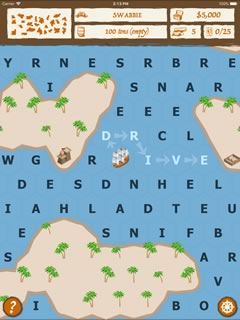Development of WindWord: From Concept to Execution

WindWord started as a simple concept for a quick word game. The idea was to create a word search grid where players could form words by linking adjacent letters. The unique twist was that players had to start with the center letter, and after completing a word, the grid shifted so that the last letter became the new center.
Evolution of the Game Design
After the initial version was built, it quickly became clear that the game felt more like navigating a map. To emphasize this feeling, the grid was transformed into a map. A hexagonal grid was chosen to create a more map-like structure, which also helped address the issue of whether diagonal moves were allowed.
The map was designed to be mostly water with random islands scattered across it. This design was more straightforward than creating a land-based map with mountains and rivers. As development continued, it became apparent that finding words in this sea of letters mirrored the sailing challenges. Sometimes the player had to tack, move against the wind, or travel a long distance to reach a small goal.
Introduction of Trading and Pirate Raids
With the map and sailing theme in mind, ports were added to each island. A trading system was integrated, allowing players to buy and sell goods at each port. The prices fluctuated over time, creating an economic dynamic within the game. To further encourage exploration, pirate raids were introduced. The chance of encountering pirates was reduced by forming longer words, discouraging players from relying on short, simple words.
Card Battle Mechanics
Pirate encounters in trading games typically involved turn-based fights. However, in WindWord, pirate raids were combined with card battles. Players could purchase cannon cards at ports, using the numbers on these cards to strategize and enhance the pirate encounters. This introduced a level of strategy to the combat mechanics, making it more engaging.
Additional Features and Programming Challenges
As development continued, additional features were introduced. A mini-map was added to help players navigate the game world. Players could also “pray” for help when they couldn’t find good words to continue progressing. Each port had a piece of a treasure map available for purchase. Collecting all the map pieces would allow the player to locate the treasure and win the game.
The game posed several programming challenges, particularly in generating a sea of random letters. Weighted letter choices, such as more e’s and fewer x’s, were initially used to improve the quality of word generation. However, this method was only partially effective. The solution was to lay out actual words in random paths across the grid, similar to how a word search is created. The remaining spaces were filled with weighted random letters, ensuring the game contained enough valid words while maintaining randomness.
Trading Economy and Progression
The trading game was designed with simple mechanics. Players started with inexpensive goods and worked their way up by finding efficient trade routes. The goal was to purchase better items and continue trading, similar to real-life trade practices. Eventually, players had to explore the entire map to collect scarce items, such as treasure map pieces and cannon cards, necessary for completing the game.
Revenue Model
WindWord was designed as a paid game, with no ads or in-app purchases. This decision was made to maintain a clean and uninterrupted user experience. The paid model also aligned with the goal of building a paid app collection. These apps would later attract more attention to the developer’s broader portfolio, without relying on revenue from ads or microtransactions.
Game Launch and Future Plans
Upon launch, WindWord was one of the most successful paid apps. Sales fluctuated, but the game generally performed well. There are plans to continue adding content, including additional items to buy, new combat strategies, and enhanced graphics. If the game continues to perform well, it could become a long-term project with regular updates, allowing it to evolve and expand over time.